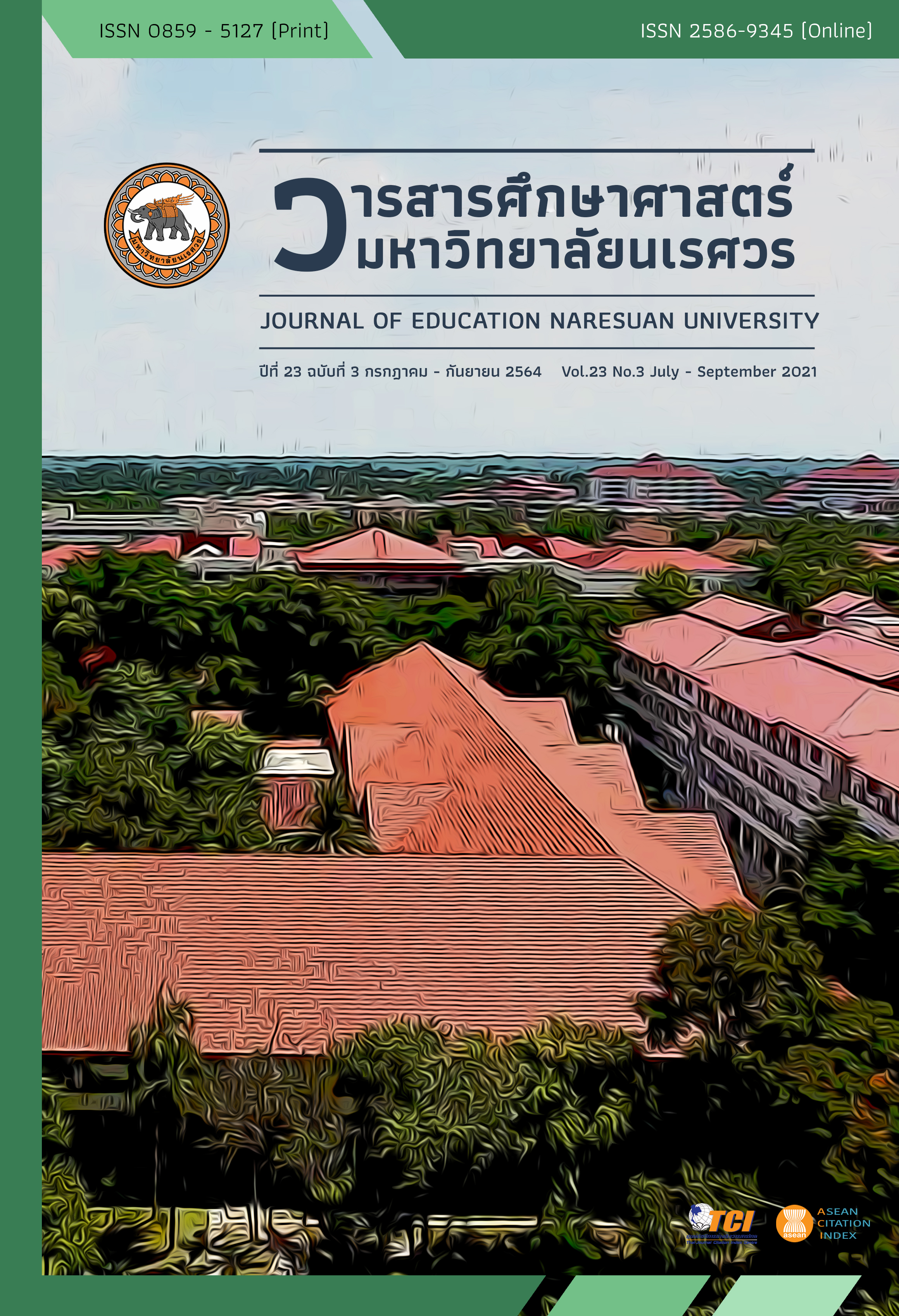ACTIVE LEARNING APPROACH TO ENHANCE DIGITAL CITIZENSHIP การจัดการเรียนเชิงรุกเพื่อส่งเสริมความเป็นพลเมืองดิจิทัล
Main Article Content
Abstract
Digital Technology has an important role and a lot of influence in the daily life of the youth, who are a mainstay of the nation. It is necessary to advise adolescents on how to use technology creatively, safely, and to become aware of Digital Citizenship. That is, they need to be capable of using information technology and communicating efficiently and properly. Youth should know how to use information technology with responsibility and safety. Also, they should be aware of opportunities and risks in the digital world, play by the rule of law, have morality, ethics, and higher order thinking skills while using. Thus, there should be a learning approach for the youths, who are becoming a new generation of people with the Digital Citizenship Skills so that they can use digital media with responsibility and ethics. In order to promote Digital Citizenship in using digital creatively and not become a victim, the author has suggested 3 major steps of active learning approach which can be divided into 6 sub-steps as follows: 1) preparation, 2) implementation of learning activities; 2.1 introduction, 2.2 presentation, 2.3 searching, 2.4 analysis, 2.5 constructing, 2.6 reflection, and 3) conclusion.
Article Details
The owner of the article does not copy or violate any of its copyright. If any copyright infringement occurs or prosecution, in any case, the Editorial Board is not involved in all the rights to the owner of the article to be performed.
References
Australian Government. (2014). Online safety. Retrieved January 28, 2019, from http://www.communications.gov.au/funding_and_programs/cyber_safety
Autthaporn, J. (2013). Development of an active online instructional model to enhance learning behaviors of undergraduate students (Master thesis). Bangkok: Chulalongkorn University. [in Thai]
Baldwin, J. & H. Williams. (1988). Active Learning: A Trainer’s Guide. Oxford: Basil Backwell.
Bangkokbiznews. (2020). Kasikorn bank manage business in the challenges of era, we keep moving forward by new strategies. Retrieved February 3, 2020, from https://www.bangkokbiznews.com/recommended/detail/1938 [in Thai]
Banjongjit, S. (2008). Active learning: A double–edged sword. Royal Thai Naval Academy Journal, 8(1), 34-42. [in Thai]
Bonwell, C. C., & Eison, J. A. (1991). Active learning: Creating excitement in the classroom. Washington, D.C.: The George Washington University, School of Education and Human Development.
Chaipatpanich, P., Ractham, P., & Kaewkitipong, L. (2015). What’s wrong with being a temple boy: A Case Study of online drama and discussion fallacies. Thammasat Journal, 34(2), 53-70. [in Thai]
Fink, L. D. (2003). Creating significant learning experiences: An integrated approach to designing college courses. San Francisco: Jossey Bass.
Global Digital Citizen Foundation. (2015). School program. Retrieved February 11, 2019, from https://globaldigitalcitizen.org/digital-citizenship-school-program
International Society for Technology in Education (ISTE). (2015). ISTE standards for students. Retrieved February 1, 2019, from https://www.iste.org/standards/for-students
Kleechaya, P. (2019). Guidelines for instruction and online lesson model for digital literacy in daily life. Retrieved January 23, 2019, from https://www.chula.ac.th/news/23096/ [in Thai]
Mayer, R. E. (2004). Should there be a three-strikes rule against pure discovery learning? The case for guided methods of instruction. American Psychologist Journal, 59, 14-19.
McCann World Group. (2016). Truth about youth. Retrieved January 23, 2019, from http://mccann.co.za/assets/files/documents/Truth-About-Youth1.pdf
Meyers, C., & Jones, T. B. (1993). Promoting active learning: Strategies for the college classroom. San Francisco: Jossey-Bass.
Ministry of Digital Economy and Society. (2019). Thailand digital economy and society development plan (2018-2037). Bangkok: Office of National Digital Economy and Society Commission. [in Thai]
Ministry of Information and Communication Technology. (2016). Thailand digital economy and society development plan. Retrieved September 20, 2019, from https://www.dga.or.th/upload/download/file_9fa5ae40143e13a659403388d226efd8.pdf [in Thai]
NetSafe New Zealand. (2014). Digital citizenship on New Zealand School; Overview. New Zealand.
Pakdeeviroch, C. (2013). The effects of organizing active learning in mathematical process skills on mathematical problem-solving ability, critical thinking ability and self-confidence of mathayomsuksa III students (Master thesis). Bangkok: Srinakharinwirot University. [in Thai]
Pornkul, C. (2016). CATS: A student-centered instructional model (9th ed.) Bangkok: Chulalongkorn University Press. [in Thai]
Prensky, M. (2001). Digital natives, digital immigrants in the horizon. MCB University Press, 9(5). Retrieved September 25, 2019, from http://www.marcprensky.com
Prontadavit, N. (2016). Active learning management (2nd ed.) Bangkok: Triple Education. [in Thai]
Pusitirattanavalee, S. (2017). Development of an active learning instructional model for teachers in the southern college of technology (Doctoral dissertation). Bangkok: Srinakharinwirot University. [in Thai]
Ribble, M. (2015). Digital citizenship in schools: Nine elements all students should know (3rd ed.). Washington DC: International Society for Technology in Education.
Ribble, M., & Bailey, G. (2007). Digital citizenship in schools. Washington DC: ISTE.
Sakonthawat, S. (2017). Management strategies of saint Gabriel’s foundation schools in Thailand according to the concept of enhancing digital citizenship in students (Doctoral dissertation). Bangkok: Chulalongkorn University. [in Thai]
Sanguankaeo, W. (2015). Digital citizens. Retrieved January 25, 2019, from https://www.stou.ac.th/study/sumrit/1-59(500)/page2-1-59(500).html [in Thai]
Songkram, N. (2013). Effect of organizing active learning and hybrid learning on design of virtual field trip and to enhance creativity for undergraduate education students. Journal of Education, Silpakorn University, 10(2), 82-95. [in Thai]
Srimode, W. (2016). Social media: Wireless media is danger for youth. Retrieved March 3, 2019, from https://www.posttoday.com/politic/report/430928 [in Thai]
Student Development Curriculum Division. (2014). Syllabus cyber wellness secondary. Singapore: Ministry of Education.


